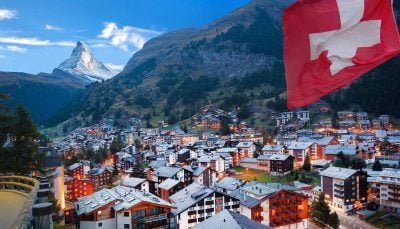Switzerland Mulls 3-year Imprisonment for People Who Heat Homes Above 66°F Amid Energy Crisis
A proposed regulation in Switzerland is meant to save natural gas. The penalties for heating a gas-supplied building are severe and can even result in imprisonment.

All Global Research articles can be read in 51 languages by activating the “Translate Website” drop down menu on the top banner of our home page (Desktop version).
To receive Global Research’s Daily Newsletter (selected articles), click here.
Visit and follow us on Instagram, Twitter and Facebook. Feel free to repost and share widely Global Research articles.
***
A proposed regulation in Switzerland would make it a criminal offense to heat a gas-supplied building above 19°C (66°F) in the event of a natural gas shortage, punishable by up to three years in prison.
The draft regulation, presented by the Department of Economic Affairs, proposes extensive savings measures in the event of a natural gas shortage. Violations of the measures are not considered administrative offenses, but criminal offenses.
The draft regulation, which is based on the federal National Economic Supply Act, also imposes a cap of 60°C (140°F) on the heating of hot water in the event of a gas crisis in winter. The use of electric radiant heaters, warm air tents, as well as saunas and pools, would also be prohibited.
Since violations against this law would be criminal offenses, they are to be prosecuted by government authorities as soon as the responsible agency takes notice of them. They can result in judicial convictions, which may lead to criminal records for the person committing the violation.
Guy Parmelin, Switzerland’s Minister of Economic Affairs, tried to assuage fears during a press conference the previous week. Switzerland is “not a police state” and there are also guidelines in other areas that are “not constantly enforced,” Parmelin argued.
It was assumed that the population would comply with the guidelines of its own accord, according to the Swiss Minister.
Swiss officials did, however, admit that if overly motivated neighbors report someone who might be violating the heating guidelines, police would be obliged to investigate the claims.
The Swiss cantons (member states of Switzerland) have until September 22 to express their concerns and propose amendments to the draft regulation.
Preparations for a rough winter across Europe
Both Italy and Germany have announced that this winter they will turn down heating in public buildings significantly compared to previous years. Italy plans to turn down the heating in homes and businesses over the winter to a maximum of 19°C (66°F), while German cities are preparing heated public dorms for the poor and elderly.
European Commission president Ursula von der Leyen insinuated in a recent speech that severe energy restrictions like these could soon be put in place all across Europe.
“During peak demand, the expensive gas comes into the market. So what we have to do is flatten the curve to avoid the peak demands, we will propose a mandatory target for reducing electricity use at peak hours and we will work very closely with the member states to achieve this,” von der Leyen said.
Meanwhile, tensions are rising across Europe, as more and more voices demand an end to the sanctions against Russia, which are the primary cause of Europe’s energy crisis. Demonstrations against the sanctions are happening across Europe, including a large demonstration in the Czech Republic with at least 70,000 people. Meanwhile, German foreign affairs minister Annalena Baerbock said in a speech that Germany will not stop the sanctions against Russia even if German citizens were to take to the streets.
*
Note to readers: Please click the share buttons above or below. Follow us on Instagram and Twitter and subscribe to our Telegram Channel. Feel free to repost and share widely Global Research articles.

